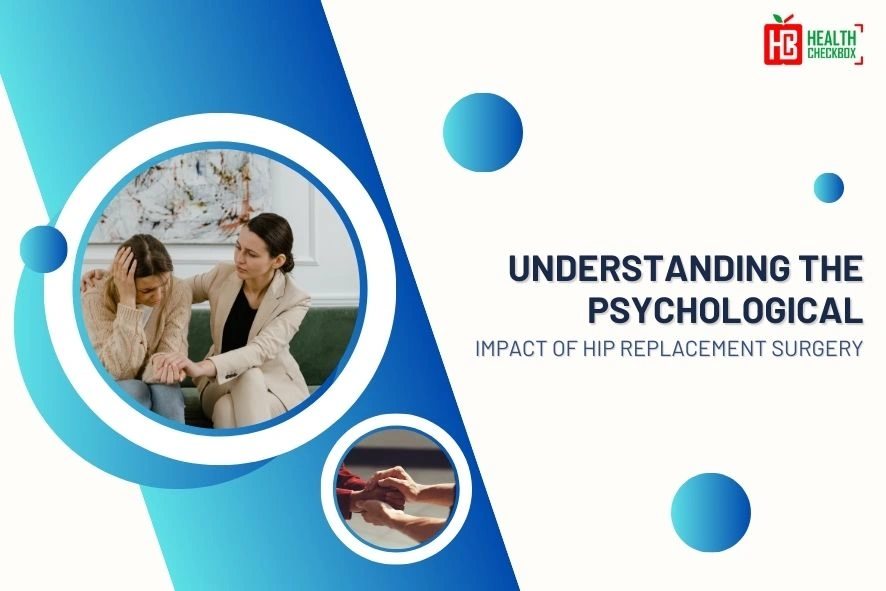Hip replacement is a major surgery and can have a deep impact on the psychological aspect of individuals, relating to healing time and emotional behavior. These effects can necessitate aggravated depression, anxiety, and increased pain. However, hip replacement is a risky procedure and comes with certain risks like other medical surgeries. If the person is well prepared for the outcome, the experienced surgeon will meticulously proceed with the surgery, decreasing the risks of complications and ensuring a timely medical surgery that is highly successful. In this blog, we will find out the psychological impact of hip replacement surgery and mental well-being.
Mental Health and Hip Replacement Connection
Researchers have come to the conclusion that there exists a connection between mental condition and the outcome of hip surgery. If patients have already conceived mental conditions like depression and anxiety then there is a likelihood of reduced working outcomes and an increase in post-surgery pain.
Patients with pre-existing mental health conditions, like depression and anxiety, may experience poorer functional outcomes and increased pain post-surgery. Research also suggests that individuals with low self-efficacy and somatization are high cases of patients with worse functional outcomes after hip replacement.
What Kinds of Psychological Conditions Can a Patient Experience After Hip Surgery?
After the medical procedure, the patient is likely to be preoccupied with psychological conditions that include:
- Depression,
- Anxiety,
- Sleep disturbances, and
- Cognitive difficulties
Various conditions that can trigger these negative thoughts include the surgery itself, the recovery process, and the emotional and physical stress associated with it.
All the below listed psychological conditions should not be taken lightly.
- Anxiety: It is connected with an excess of nervousness and fear regarding the surgery. Also the patient may worry about the recovery period and various problems associated with the surgery.
- Depression: Afersurgey depression is another issue and a common happening. Not showing any interest in activities, tiredness, unable to concentrate, and a suicidal tendency are some common attributes of depression.
- Sleep Problems: Issues related to sleep patterns can be a concern after the medical surgery. And can lead to insomnia, nightmares, and difficulty staying asleep.
- Cognitive Dysfunction: Some patients may experience memory loss, trouble concentrating, and decreased cognitive function following surgery. Besides, some patients may experience cognitive improvement over time. Else, these changes can persist for months or even years.
- Post-Traumatic Stress Disorder (PTSD): In some situations, a surgical experience after trauma can result in the development of PTSD. It is characterized by intrusive thoughts, nightmares, and surgery-related avoidance behaviors.
Do Patients Experience Psychological Conditions After Recovery?
Yes, these conditions impact recovery, which involve a willingness and desire to get better. Keep in mind that many individuals can achieve a level of mobility comparable to their previous ability. If they have had hip problems for a long period, they may be able to function better after having one replaced. However, getting there demands ambition and persistence.
Physical therapy must commence immediately following surgery. It will improve hip function. And strengthening exercises will restore the full range of motion, improve mobility, and ensure stability. Eating a diet rich in proteins helps with bone strengthening and quick recovery. Taking vitamins and minerals such as vitamin D and calcium are vital to maintain a healthy bone mass.
Solution
Anxiety and despair are frequently experienced by older individuals following a catastrophic accident. They may feel as if their life is coming to an end. Although they have many wonderful years ahead of them. People who live alone or do not have quick help most experience such things. As a result, creating a support system is a critical component of the rehabilitation process. We encourage family and friends of those who have had a fractured hip to form a thorough support team for the weeks after surgery and, preferably, beyond.
- Always being in touch with your orthopedic surgeon, physical therapist, and primary care physician. It allows you to address any difficulties quickly.
- One should make sure or commit himself or herself to provide the patient with a well-balanced meal. It should be rich in the vitamins and minerals required for quick recovery.
- Visits to the patient, if possible, and frequent communication to ensure the patient is on track and motivated during their recuperation.
- Someone to encourage the patient to engage in everyday exercise in between physical therapy appointments. This person can take action to improve their own health.
- A mental health professional, particularly when the patient’s abilities have been impaired or their recuperation is taking longer than planned.
Conclusion
Finally addressing various psychosocial aspects of recovery, hip replacement surgery in the patients should not be regarded as the end of the road. Rather, with proper assistance and a commitment to recovery and health, patients can live a long and healthy life, frequently retaining their previous abilities.

